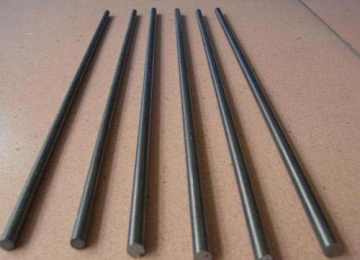
4J58 alloy is an alloy material with a specific expansion coefficient. It has a stable expansion coefficient in the temperature range from room temperature to 600°C, and is basically consistent with the expansion coefficient of steel and cast iron. This alloy also has good processing properties and can be easily formed and processed. In addition, 4J58 alloy shows good dimensional stability in long-term use and has certain corrosion resistance. This makes it play an important role in applications that require control of thermal expansion and contraction, such as precision instruments, precision measurement equipment, and various high-precision mechanical components.
Agregue su texto de encabezado aquí
4J58 chemical properties alloy has good corrosion resistance in the atmosphere, fresh water and sea water.
Material | 4J58 | ||||||
chemical composition | C | PAGS | S | Minnesota | Si | Ni | Fe |
≦0.03 | ≦0.015 | ≦0.015 | ≦0.60 | ≦0.25 | 57.5-59.5 | margin | |
Thermal properties of 4J58 alloy
Melting temperature range: 1430~1450℃.
Thermal conductivity λ=20.9W/(m?℃).
The 4J58 linear expansion coefficient standard stipulates that the alloy linear expansion coefficient α1 (20~100℃)=(11.1~11.9)×10-6℃-1.
temperature range/℃ |
| temperature range/℃ | /10-6℃-1 |
20~50 20~100 20~200 20~300 | 10.6 11.3 11.5 11.7 | 20~400 20~500 20~600
| 11.9 12.1 12.3
|
Physical properties of 4J58 alloy
Density ρ=8.32g/cm3
Resistivity ρ=0.3μΩ·m.
Curie point Tc≈600℃.
The magnetic properties of 4J58 alloy are shown in the table below:
At 4000A/m, the residual magnetic induction intensity Br=0.49T, and the coercive force Hc=50A/m.
H/(A/m) | B/T | H/(A/m) | B/T | H/(A/m) | B/T |
8 16 24 40 | 2.0×10-2 3.0×10-2 5.0×10-2 0.10 | 80 160 400 800 | 0.41 0.85 1.19 1.37 | 2000 4000
| 1.49 1.53
|
4J58 mechanical properties
The tensile properties of 4J58 alloy (annealed state) at room temperature are shown in the table below:
σb/MPa | σP0.2/MPa | δ/% |
550 | 206 | 35 |
Heat treatment system of 4J58 alloy
For the heat treatment system of 4J58 alloy, the standard stipulates the following steps:
Place the expansion coefficient performance test sample in a hydrogen or vacuum environment.
Heat the sample until its temperature reaches 900℃±20℃.
Keep the sample at this temperature for 1 hour to ensure adequate heat treatment.
Cool the sample to below 200°C at a speed of no more than 5°C/min.
Remove the specimen from the heat treatment equipment.
This heat treatment regime is designed to control and optimize the 4J58 alloy to meet its stability requirements in temperature-changing environments. Such a heat treatment process helps improve the internal structure and properties of the alloy and ensures that it has the required thermal expansion and contraction behavior.
4J58 smelting and casting process
For the smelting and casting process of 4J58 alloy, the following steps are generally followed:
First, the 4J58 alloy is smelted using a non-vacuum induction furnace or electric arc furnace. These furnaces provide a high temperature environment and melt alloy materials.
In the furnace, the corresponding raw materials and alloying elements are gradually added to ensure the correct proportions and proportions of ingredients. This results in the desired alloy composition and properties.
Through proper operation and control, the temperature and cooling process in the furnace are maintained so that the alloy materials can be fully melted and mixed. This helps to obtain a uniform solution and eliminate impurities.
After the smelting is completed, the step of electroslag redissolution can be carried out. This step helps remove impurities, making the alloy purer and ensuring the stability of its properties.
Through the above smelting and casting process, 4J58 alloy with the required chemical composition and good properties can be obtained.
Application fields of 4J58 alloy
4J58 alloy has a wide range of applications in the field of precision measurement. The following are one of its main application areas:
Manufacturing of precision linear rulers (standard rulers): 4J58 alloy is widely used in the manufacture of precision linear rulers (standard rulers) due to its stable performance and dimensional characteristics. These ruler measuring devices are used to measure lengths with high accuracy and reliability.
Graduation ruler manufacturing: 4J58 alloy is also suitable for manufacturing gradation rulers fixed on the coordinate boring machine bed. Graduation ruler is an important tool for measuring the size and position of parts during machining. The stability and wear resistance of 4J58 alloy make it an ideal choice for manufacturing graticules.
In addition to the above applications, 4J58 alloy can also be used in other fields that require stability and precision measurement, such as optical instruments, navigation instruments, aerospace and precision processing equipment, etc.
4J58 alloy usage requirements
Special attention should be paid to the content of carbon and other impurities during production and acceptance, as they are one of the causes of dimensional instability. In addition, the internal stress caused by the subsequent processes should be minimized, and the production cycle should be appropriately lengthened for natural aging.

